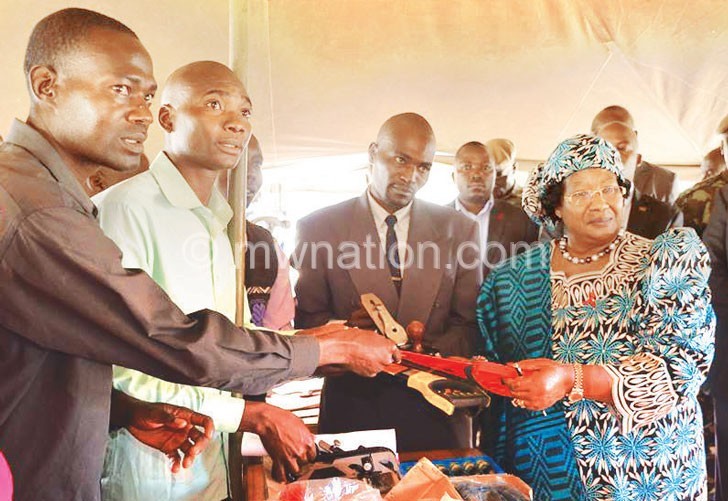Govt gives up Yedef loans
Government has given up on reclaiming billions of kwacha it loaned out to some youths through the Youth Enterprise Development Fund (Yedef) for business start-ups. Minister of Labour, Youth , Sports and Manpower Henry Mussa the fund’s line minister confirmed this week that Capital Hill has written-off the loans that critics say were largely given based on political leanings rather than sound business cases.
Mussa could not state the written off amount, but published reports say it is well over K1 billion of taxpayers’ money.

Between 2009 the election year it was established and 2013 when it was suspended the fund had loaned out K1.6 billion, but only recovered K352 million.
A brainchild of former president, the late Bingu wa Mutharika, Yedef started with an initial capital of K3 billion, but government later pumped in more resources, citing rising demand.
The fund was managed under the Malawi Rural Development Fund (Mardef), which has morphed into Malawi Enterprise Development Fu n d ( M e d f ) , a f t e r absorbing the operations of Yedef and the Farm Input Loan Programme (Filp).
Filp is another politicallymotivated initiative, but unlike Mardef and Yedef that were dreamt up by the late Mutharika, the input scheme was hatched by former president Joyce Banda.
In its short-life span from 2013 when it was set up ahead of the 2014 tripartite elections Filp too has had its own checkered history of politically-linked people getting farm inputs on loan without paying back.
Mussa said instead of spending energy trying to recover Yedef loans, government will focus on learning lessons from the debacle and disciplining controlling officers who authorised the loans.
“We have to concede that the loans cannot be repaid and move on. We will investigate what happened so that we draw lessons for future programmes, and also that the controlling officers responsible are dealt with,” said Mussa.
The move to forego the billions in Yedef ’s non-performing loans sends alarm bells about a possible similar approach to the over K6 billion in toxic loans, most of which the then Stateowned Malawi Savings Bank (MSB) contracted to businesspeople linked to the Democratic Progressive Party (DPP).
Government struck the toxic assets off MSB’s books ahead of its sell to FDH Holdings Limited and set up an ineffective debt collection vehicle that has got nothing so far roughly a year after the move.
Filp a K25 billion nightmare could also follow the same forgiving path by a broke, but apparently magnanimous Capital Hill, leaving the broader taxpayer clutching the bills while political hand-clappers, cadets and gyrating party cheer leaders laugh all their way to the next handout disguised as economic empowerment initiatives.
A source at the Ministry of Labour, Youth, Sports and Manpower Development blamed political interference for the costly initiative that saw government provide loans to youths, mostly with ties to the ruling party, without any due diligence or entrepreneurial training.
“The current decision to write off the loans is also highly political. Government could still have insisted on reclaiming the loans per conditions of initial agreements,” said the source.
The move to cancel the loans is in sharp contrast to an earlier pledge by then Minister of Youth and Sports Development Grace Chiumia to strive to reclaim the loans.
Reacting to the Yedef loan cancellation decision, opposition Malawi Congress Party (MCP) lawmaker Peter Dimba, who sits on the party’s finance committee in Parliament, said the move was “unfortunate”.
“It is very unfortunate. The money that was disbursed came from taxpayers, and it is unfortunate that once again it was party zealots who benefited from this programme.
You remember in the case of MSB Bank, government also spent K6 billion to bail out defaulters mostly who were politically connected and up to now, no single tambala has been reclaimed.
“You also recall the issue of the tractors in which government took a loan from India and bought the tractors in the name of the poor before selling the same to politically connected people at below market prices. This is a trend,” said Dimba.
Ministry of Labour spokesperson Symon Mbvundula said Treasury and Medf were better placed to explain the decision to give up the loans. Both Minister of Finance, Economic Planning and Development Goodall Gondwe and Medf chief executive officer, Joe Manonga, said they were not aware of any plans to write off the loans.
“I have just returned in the country, but prior to that I do not recall any discussion about the issue. Maybe cross-check with Secretary to Treasury,” said Gondwe.
On his part, Manonga said no decision pertaining to the loans has been communicated to the institution, which took over administration of the loans through the merging of the separate government microloans bodies.





